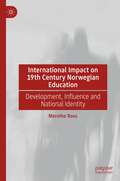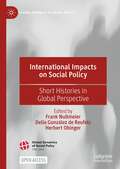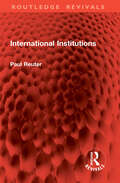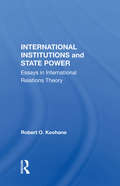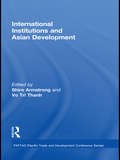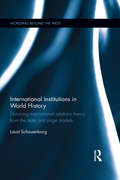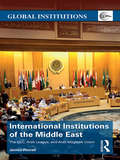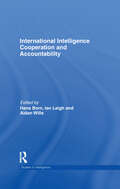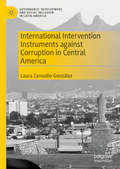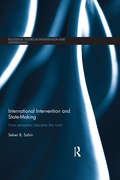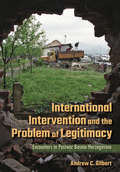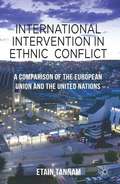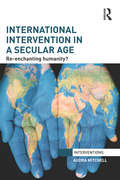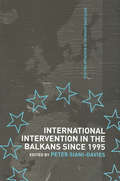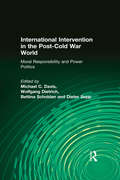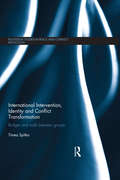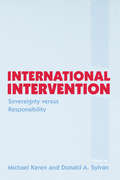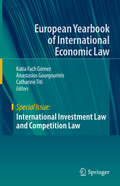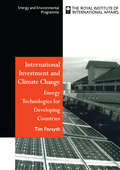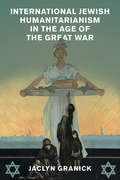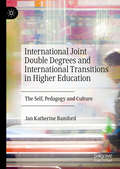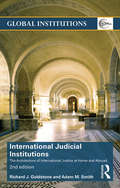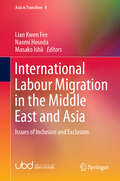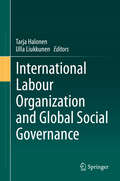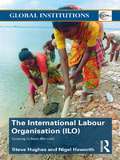- Table View
- List View
International Impact on 19th Century Norwegian Education: Development, Influence and National Identity
by Merethe RoosThis book examines Norwegian education throughout the course of the 19th century, and discusses its development in light of broader transnational impulses. The nineteenth century is regarded as a period of increasing national consciousness in Norway, pointing forward to the political independency that the country was granted in 1905. Education played an important role in this process of nationalisation: the author posits that transnational – for the most part Scandinavian – impulses were more decisive for the development of Norwegian education than has been acknowledged in previous research. Drawing on the work of educator and school bureaucrat Hartvig Nissen, who is recognised as the most important educational strategist in 19th century Norway, this book will be of interest to scholars of the history of education and Norwegian education more generally.
International Impacts on Social Policy: Short Histories in Global Perspective (Global Dynamics of Social Policy)
by Herbert Obinger Frank Nullmeier Delia González de ReufelsThis open access book consists of 39 short essays that exemplify how interactions between inter- and trans-national interdependencies and domestic factors have shaped the dynamics of social policy in various parts of the world at different points in time. Each chapter highlights a specific type of interdependence which has been identified to provide us with a nuanced understanding of specific social policy developments at discrete points in history. The volume is divided into four parts that are concerned with a particular type of cross-border interrelation. The four parts examine the impact on social policy of trade relations and economic crises, violence, international organisations and cross-border communication and migration. This book will be of interest to academics and postgraduate students in the field of social policy, global history and welfare state research from diverse disciplines: sociology, political science, history, law and economics.
International Institutions (Routledge Revivals)
by Paul ReuterOriginally published in 1958, this book assesses the continuity and variety of international societies as they have existed in recent history. Although the study of international institutions is firmly based on a foundation of law, this book also encompasses sociology, history and politics. The introduction defines the elements of international society in terms of the accepted principles of group psychology. Part 1 considers the origins of 20th Century international institutions. This historical analysis runs from the ancient civilizations through to the greatly changed relations which followed World War II. The general notions and sources of international law are then examined. Part 2 deals with the structure of day-to-day relations between States and the means of recognizing changes within a State. The United Nations and principal regional organizations are also examined.
International Institutions And State Power: Essays In International Relations Theory
by Robert O KeohaneThe essays in this book trace the development of the author’s thinking about international institutions between 1980 and 1988. The introduction, written especially for this volume, summarizes and defends the "neoliberal institutionalism" that he advocates as a framework for understanding world politics.
International Institutions and Economic Development in Asia (PAFTAD (Pacific Trade and Development Conference Series))
by Shiro ArmstrongAre international and Asian regional institutions serving the development goals of Asian and Pacific Economies as well they should? The global economy, led by the Asia Pacific region, has undergone immense change and growth. Have the existing institutions and arrangements been able to keep pace with those changes in the global economy? International Institutions and Asian Development tackles these questions and is an essential book for the assessment of regional and international institutions, as well as policy prescriptions for reforming them to ensure they deliver on sustainable, peaceful growth and development in the region. Drawing from papers presented to the 32nd Pacific Trade and Development conference in Hanoi in 2007, the contributions by distinguished authors add to the understanding of the purpose, evolution, relevance and gaps in regional and global institutions and their arrangements. Shiro Armstrong is a Research Fellow at the Crawford School of Economics and Government at the Australian National University. Vo Tri Thanh is Director of the Department for International Economic Integration Studies of the Central Institute of Economic Management in Vietnam
International Institutions in World History: Divorcing International Relations Theory from the State and Stage Models (Worlding Beyond the West)
by Laust SchouenborgThis book presents a case for a basic reorientation of International Relations away from the state and towards the study of social institutions in the sense of patterned practices, ideas and norms/rules. IR has always suffered from a parochial occupation with the state and the Western system of state. Its main theories revolve around these phenomena, and have resulted in the reification of the state: it has been turned into an essential actor, with certain immutable and fundamental properties that remain constant throughout time. A list of these properties usually includes territorial limits, centralisation, monopolisation of violence and exclusive loyalties. International Institutions in World History shows how the state is an inherently modern phenomenon, a modern social institution, and that foundational concepts in IR should be based on a full appreciation of the wider record of human existence on earth, trans-historically and cross-culturally. Schouenborg argues that these social institutions may be captured via a universal functional typology consisting of four categories: legitimacy and membership; regulating conflicts; trade; and governance. The book will be of interest to scholars and students within IR (particularly IR theory), anthropology, archaeology and sociology, and those interested in general social theory.
International Institutions of the Middle East: The GCC, Arab League, and Arab Maghreb Union (Global Institutions)
by James WorrallThis volume is a key text for understanding the major regional international organizations of the Middle East. Analysing the Arab League, the Gulf Cooperation Council, and the Arab-Maghreb Union in a concise and accessible format, it explores their successes and failures across their full range of activities (economic, social, and political), while contextualising the reasons why many consider that these organizations have stalled.The book:- assesses the reasons why IOs in the Middle East are under-developed relative to neighbouring regional organizations;- explores their history, evolution, and structure, while considering the successes and failures of each IO;- analyses the reasons for the specific difficulties faced by each organization through the context of intra-regional relations;- develops a new framework for analysing the forces that have shaped these bodies and challenges the existing narrative that largely ignores the achievements and prospects of the organizations;- considers the likely impact of the Arab Spring upon the future development of these frequently overlooked regional international organizations.This book will be of great interest to students and scholars of Middle East studies, international organizations, and global governance, as well as diplomats and policymakers
International Intelligence Cooperation and Accountability (Studies in Intelligence)
by Hans BornThis book examines how international intelligence cooperation has come to prominence post-9/11 and introduces the main accountability, legal and human rights challenges that it poses. Since the end of the Cold War, the threats that intelligence services are tasked with confronting have become increasingly transnational in nature – organised crime, the proliferation of weapons of mass destruction and terrorism. The growth of these threats has impelled intelligence services to cooperate with contemporaries in other states to meet these challenges. While cooperation between certain Western states in some areas of intelligence operations (such as signals intelligence) is longstanding, since 9/11 there has been an exponential increase in both their scope and scale. This edited volume explores not only the challenges to accountability presented by international intelligence cooperation but also possible solutions for strengthening accountability for activities that are likely to remain fundamental to the work of intelligence services. The book will be of much interest to students of intelligence studies, security studies, international law, global governance and IR in general.
International Intervention Instruments against Corruption in Central America (Governance, Development, and Social Inclusion in Latin America)
by Laura Zamudio-GonzálezThis book analyzes the innovative international intervention instruments against corruption in Central America called Hybrid Anticorruption Agencies or HACAS. The author aims to disclose and explain the decision of the United Nations and the Organization of American States to promote, separately but with a similar rationale, a new strategic approach to fighting corruption through the creation of two HACAS. Specifically, the book examines the International Commission Against Impunity in Guatemala (CICIG) and the Mission to Support the Fight against Corruption and Impunity in Honduras (MACCIH). The CICIG and the MACCIH represent unique cases of anti-corruption hybrid commissions because they combine resources, participants and/or national and international institutions which, in a coherent and integrated manner, strengthen the investigation, prosecution, and punishment of corrupt and criminal acts. The book also studies the HACAS as international instruments not free from risks and limitations.
International Intervention and State-making: How Exception Became the Norm (Routledge Studies in Intervention and Statebuilding)
by Selver B. SahinThis book analyses the changing dynamics of sovereignty resulting from contemporary international state-building interventions. It aims to highlight how the exercise of ‘exceptional’ forms of power by intervening agencies impacts on the sovereign capacity of intervened states. Drawing upon in-depth analyses of three case studies – Kosovo, East Timor and the Kurdistan Regional Government, the book shifts the focus of the debate to the nature of contemporary intervention as an act of statemaking, and argues that foreign intervention changes the dynamics of political power upon which sovereignty is structured. At the same time, it reveals how intervention reproduces the imposed conditions of international state-making, thus permanently internalising external regulatory mechanisms. International intervention, in other words, becomes the constitutive element of governance in the newly created state. This book will be of much interest to students of statebuilding, war and conflict studies, global governance, security studies and IR.
International Intervention and the Problem of Legitimacy: Encounters in Postwar Bosnia-Herzegovina
by Andrew GilbertIn International Intervention and the Problem of Legitimacy Andrew C. Gilbert argues for an ethnographic analysis of international intervention as a series of encounters, focusing on the relations of difference and inequality, and the question of legitimacy that permeate such encounters. He discusses the transformations that happen in everyday engagements between intervention agents and their target populations, and also identifies key instabilities that emerge out of such engagements. Gilbert highlights the struggles, entanglements and inter-dependencies between and among foreign agents, and the people of Bosnia-Herzegovina that channel and shape intervention and how it unfolds.Drawing upon nearly two years of fieldwork studying in postwar Bosnia and Herzegovina, Gilbert's probing analysis identifies previously overlooked sites, processes, and effects of international intervention, and suggests new comparative opportunities for the study of transnational action that seeks to save and secure human lives and improve the human condition.Above all, International Intervention and the Problem of Legitimacy foregrounds and analyzes the open-ended, innovative, and unpredictable nature of international intervention that is usually omitted from the ordered representations of the technocratic vision and the confident assertions of many critiques.
International Intervention in Ethnic Conflict
by Etain TannamThe EU and the UN have become increasingly involved in conflict resolution, yet they are rarely compared systematically. This book focuses on the role of bureaucracies in the European Union (EU) and the United Nations (UN) when dealing with conflict. Tannam's comparative analysis of EU and UN policy-making procedures explores how and why they differ from each other, arguing that the UN Secretariat and the European Commission have autonomy under certain conditions and that reducing explanations of EU and UN policy outcomes to political will, or to the preferences of member states is inaccurate. This unique empirical study, enhanced by interviews with practitioners, will be a valuable resource for scholars of International Relations, Peace Studies and Comparative Politics.
International Intervention in a Secular Age: Re-Enchanting Humanity? (Interventions)
by Audra MitchellInternational intervention is not just about ‘saving’ human lives: it is also an attempt to secure humanity’s place in the universe. This book explores the Western secular beliefs that underpin contemporary practices of intervention—most importantly, beliefs about life, death and the dominance of humanity. These beliefs shape a wide range of practices: the idea that human beings should intervene when human lives are at stake; analyses of violence and harm; practices of intervention and peace-building; and logics of killing and letting die. Ironically, however, the Western secular desire to ensure the meaningfulness of human life at all costs contributes to processes of dehumanization, undercutting the basic goals of intervention. To explore this paradox, International Intervention in a Secular Age engages with examples from around the world, and draws on interdisciplinary sources: anthropologies of secularity and IR, posthumanist political philosophy, ontology and the sociology of death. This book offers new insight into perennial problems, such as the reluctance of intervenors to incur fatalities, and international inaction in the face of escalating violence. It also exposes new dilemmas, such as the dehumanizing effects of quantifying casualties, Western secular logics of killing, and the appropriation of lives and deaths through peace-building processes. It will be of great interest to students and scholars of international relations, political philosophy, international ethics and social anthropology.
International Intervention in the Balkans since 1995 (Routledge Advances in European Politics #Vol. 4)
by Peter Siani-DaviesThis volume offers an analysis of the activities of the international community in the Balkans since the 1995 Dayton Agreement. There has been substantial investment in the region but so far the gains have been limited and doubts remain as to the extent that sustainable security has been enhanced. There is a need for serious reassessment of policies and priorities, but this depends on a careful analysis of past successes and failures. The contributors seek to provide this by examining intervention, not just in terms of military action and the activities of major international agencies at state level, but also the activities of outside NGOs within the local environment.
International Intervention in the Post-Cold War World: Moral Responsibility and Power Politics
by Wolfgang Dietrich Michael C. Davis Bettina ScholdanInternational intervention on humanitarian grounds has been a contentious issue for decades. First, it pits the principle of state sovereignty against claims of universal human rights. Second, the motivations of intervening states may be open to question when avowals of moral action are arguably the fig leaf covering an assertion of power for political advantage. These questions have been salient in the context of the Balkan and African wars and U.S. policy in the Middle East. This volume undertakes a serious, systematic, and broadly international review of the issues.
International Intervention, Identity and Conflict Transformation: Bridges and Walls Between Groups (Routledge Studies in Peace and Conflict Resolution)
by Timea SpitkaThis book addresses the challenges of international intervention in violent conflicts and its impact on groups in conflict. When the international community intervenes in a violent internal conflict, intervening powers may harden divisions, constructing walls between groups, or they may foster transformation, soften barriers and build bridges between conflicting groups. This book examines the different types of external processes and their respective contributions to softening or hardening divisions between conflicting groups. It also analyses the types of conflict resolution strategies, including integration, accommodation and partitioning, and investigates the conditions under which the international community decides to pursue a particular strategy, and how the different strategies contribute to solidification or transformation of group identities. The author uses three case studies, Bosnia and Herzegovina (BiH), Northern Ireland and Israel-Palestine, to reveal how different types of external interventions impact on the identities of conflicting groups. The volume seeks to address how states and international organizations ought to intervene in order to stimulate the building of bridges rather than walls between conflicting groups. In doing so, the book sheds light on some of the pitfalls in international interventions and highlights the importance of united external process and inclusive identity strategies that promote transformation and bridge differences between conflicting groups. This book will be of much interest to students of intervention, peace and conflict studies, ethnic conflict, security studies and IR.
International Intervention: Sovereignty versus Responsibility
by Michael Keren Donald A. SylvanNational sovereignty, defined as a nation's right to exercise its own law and practise over its territory, is a cherished norm in the modern era, and yet it raises great legal, political and ethical dilemmas. This study looks at the problems created by international intervention.
International Investment Law and Competition Law (European Yearbook of International Economic Law)
by Katia Fach Gómez Anastasios Gourgourinis Catharine TitiThis EYIEL special issue examines the interaction between international investment law and competition law. Although issues related to both international investment law and competition law arise regularly in international legal practice and are examined together, scholarly analysis largely treats them as parallel universes. As a result their actual and potential overlap has yet to be sufficiently explored. In this light, International Investment Law and Competition Law discusses a variety of topics at the intersection of investment and competition, including the interaction between competition-related provisions and investment protection standards in free trade agreements; investors’ anti-competitive behaviour and illegal investments; state aid schemes and foreign investors’ legitimate expectations; EU member States’ compliance with investment awards as (illegal) state aid under EU law; State-owned enterprises and competitive neutrality; and interactions between public procurement, investment and competition law.
International Investment and Climate Change: Energy Technologies for Developing Countries
by Timothy ForsythThis study, based on fieldwork and case studies of southeast Asian countries shows how privatization, investment and new energy technologies can be integrated to combat climate change and provide the maximum return for investors. The author explains what incentives and regulatory structures are needed that do not damage local competitiveness. Asserting that technology transfer is fundamental to effective policies for climate change and for economic development, the text examines how the benefits can be maximized.
International Jewish Humanitarianism in the Age of the Great War (Human Rights in History)
by Jaclyn GranickIn 1914, seven million Jews across Eastern Europe and the Eastern Mediterranean were caught in the crossfire of warring empires in a disaster of stupendous, unprecedented proportions. In response, American Jews developed a new model of humanitarian relief for their suffering brethren abroad, wandering into American foreign policy as they navigated a wartime political landscape. The effort continued into peacetime, touching every interwar Jewish community in these troubled regions through long-term refugee, child welfare, public health, and poverty alleviation projects. Against the backdrop of war, revolution, and reconstruction, this is the story of American Jews who went abroad in solidarity to rescue and rebuild Jewish lives in Jewish homelands. As they constructed a new form of humanitarianism and re-drew the map of modern philanthropy, they rebuilt the Jewish Diaspora itself in the image of the modern social welfare state.
International Joint Double Degrees and International Transitions in Higher Education: The Self, Pedagogy and Culture
by Jan Katherine BamfordThis book explores the interplay between culture and pedagogy within the student experience of international joint double degree programmes. The author posits that international higher education can be seen within a construct of mutuality, with the experience of internationalisation being a driving force for the development of agency and cultural awareness. This direct, lived reality of experiencing cultural difference as part of the educational process presents an opportunity for the internationalisation of the self: international joint double degrees provide an ideal vehicle for the development of knowledge and broadening of the mind. Drawing together cultures of learning, differing approaches to pedagogy and the international classroom, this book argues that international joint double degrees constitute an active cultural engagement within a higher education context.
International Judicial Institutions: The architecture of international justice at home and abroad (Global Institutions)
by Richard J. Goldstone Adam M. SmithThis fully-updated and much expanded second edition provides a much needed, short and accessible introduction to the current debates in international humanitarian law. Written by a former UN Chief Prosecutor and a leading international law expert, this book analyses the legal and political underpinnings of international judicial institutions, it provides the reader with an understanding of both the historical development of institutions directed towards international justice, as well as an overview of the differences and similarities between such organizations. New to this edition: New updates on recently found records of the United Nations War Crimes Commission. Updates on the recent judicial decisions of the International Criminal Tribunal for the former Yugoslavia and International Criminal Tribunal for Rwanda Updates on the Special Tribunal For Lebanon A re-evaluation of the future of the International Criminal Court International Judicial Institutions: Second Edition will be of great interest to students of International Politics, Criminology and Law.
International Labour Migration in the Middle East and Asia: Issues of Inclusion and Exclusion (Asia in Transition #8)
by Kwen Fee Lian Naomi Hosoda Masako IshiiThe discourse on migration outcomes in the West has largely been dominated by issues of integration, but it is more relevant to view immigration in non-Western societies in relation to practices of exclusion and inclusion. Exclusion refers to a situation in which individuals and groups are usually denied access to the goods, services, activities and resources associated with citizenship. However, this approach has been criticised in relation to gender issues, which are very relevant to the situation of migrants. The authors in this volume address this criticism. Furthermore, when framed within a North–South discourse, it may be potentially ethnocentric to assume that the experience of exclusion is cross-culturally uniform. Indeed, work on migration issues has invariably been conducted within such a discourse. The contributors go beyond this binary discourse of ‘exclusion versus inclusion’ which has dominated migration research. They examine the situation of migrants in the Middle East and Asia as one that encompasses both exclusion and inclusion, addressing related concepts of empowerment, ethnocracy, the feminisation of migration and gendered geographies of power, liberal constraint and multiculturalism, individual agency, migrant-friendly discourses, spaces of emancipation and spaces of insecurity. The book highlights current research in the Arab Gulf states, and examines multiculturalism in Asia more broadly. It will be of particular interest to students and researchers in international labour migration studies in the Middle East and Asia.
International Labour Organization and Global Social Governance
by Ulla Liukkunen Tarja HalonenThis open access book explores the role of the ILO (International Labour Organization) in building global social governance from multiple and mutually complementary perspectives. It explores the impact of this UN´s oldest agency, founded in 1919, on the transforming world of work in a global setting, providing insights into the unique history and functions of the ILO as an organization and the evolution of workers’ rights through international labour standards stemming from its regulatory mechanism.The book examines the persistent dilemma of balancing the benefits of globalization with the protection of workers. It critically assesses the challenges that emerge when international labour standards are implemented and enforced in highly diverse regulatory frameworks in international, regional, national and local contexts. The book also identifies feasible ways to achieve more inclusive labour protection, putting into perspective the tension between the economic and the social in the ILO’s second century of operation. It includes reflections on the work of the ILO World Commission on the Social Dimension of Globalisation by Tarja Halonen, who as President of Finland co-chaired the Commission with Benjamin William Mkapa, President of Tanzania.Written by distinguished experts and scholars in the fields of international labour law and international law, the book provides an insightful and in-depth analysis of the role of the ILO as an international organization devoted to decent work and social justice. It also sheds light on tripartism and its particular role in the work of the ILO, examining the challenges that a profoundly changing working life presents in terms of labour protection and social justice, and examining the transnational dimension of labour law. Lastly, the book includes a postscript by Nobel economics laureate Professor Joseph E. Stiglitz.
International Labour Organization: Coming in from the Cold (Global Institutions)
by Steve Hughes Nigel HaworthThe International Labour Organization (ILO) is broadening its agenda and carving out a role as a key player in global economic policy-making, and this volume provides a succinct and comprehensive guide to this important organization. By charting the history and development of the ILO and examining its key functions and structure the authors offer a clear and detailed account of its work, and provide an important discussion of the current criticisms and debates that surround the organization. The work moves on to discuss the position that the ILO takes in our understanding of global governance and seeks to evaluate the impact of emerging issues such as the global economic crisis, and critically examines the future direction of the organization. This fresh and accessible account of the International Labour Organization provides an excellent understanding of its purpose and structure and will be of interest to all students of international politics, international organizations and international political economy.
